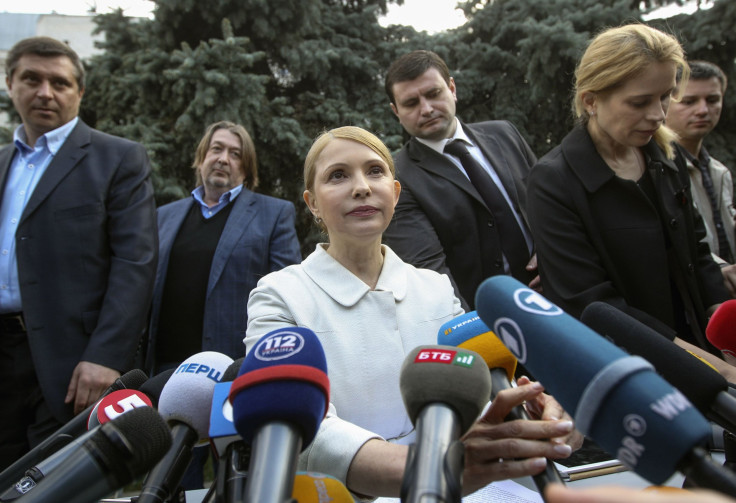Who Is Yulia Tymoshenko, Ukrainian Presidential Candidate Jailed By Viktor Yanukovych?

Former Ukrainian Prime Minister Yulia Tymoshenko was hailed as a hero of the 2004 Orange Revolution before she spent three years in jail for allegedly politically motivated crimes. Now, Tymoshenko is running for president of Ukraine, but who exactly is she? And why is she a controversial choice for many Ukrainians?
Tymoshenko first made a name for herself in 1991 as general director and co-founder of the Ukrainian Petrol Corporation, a business venture that for a time made her one of the 100 wealthiest Ukrainians. After being elected to the Ukrainian parliament, the Verkhovna Rada, in 1996, her experience in the energy industry led to her appointment as the deputy prime minister for fuel and energy under then-prime minister Viktor Yushchenko in 1999. That same year Tymoshenko co-founded the center-right Fatherland party, an opposition party geared toward opposing then-President Leonid Kuchma.
Tymoshenko was a well-known name for years in Ukraine, but she exploded to international prominence in 2004 for her role in the Orange Revolution. That year, Yushchenko and now-exiled former president Viktor Yanukovych ran for the Ukrainian presidency. When allegations that Yanukovych had rigged a runoff election in his favor, Tymoshenko led a series of protests and civil disobedience efforts dubbed the Orange Revolution that demanded a second run-off election.
Ultimately, Tymoshenko was successful in her efforts, and a second run-off vote was held a month later. The Ukrainian Supreme Court ruled that the new vote, which handily went to Yushchenko, was legitimate and Yushchenko ascended to the presidency in 2005. For her part in organizing the Orange Revolution, Tymoshenko was seen as a hero throughout Ukraine.
For several months in 2005, Tymoshenko was named acting prime minister. She would later win the office herself in 2007. After a failed 2010 presidential bid, however, Tymoshenko was arrested and convicted of embezzlement and abuse of power in 2011. Tymoshenko and her supporters allege that Yanukovych, who won the election and held the presidency until he was driven out of the country in February, fabricated the charges and imprisoned her for purely political reasons.
Tymoshenko served only three years of her seven-year sentence, released on Feb. 22 as part of a deal signed by Yanukovych upon leaving office. Since her release, Tymoshenko has met with European leaders Angela Merkel and Donald Tusk at a political conference in Dublin.
Thursday afternoon, Tymoshenko, out of jail for a little more than a month, announced that she would seek the presidency following Yanukovych’s exile. Other contenders include boxing champion-turned-politician Vitaliy Klitschko and chocolate tycoon Petro Poroshenko.
“I will be the candidate of Ukrainian unity,” Tymoshenko announced at a news conference. “The west and center of Ukraine has always voted for me, but I was born in the east, in Dnepropetrovsk.”
Though Tymoshenko has remained popular with many Ukrainians, this week’s leak of her allegedly calling for the deaths of all Russians in Ukraine could seriously hurt her chances at the Ukrainian presidency. On Monday, audio from a phone call allegedly between Tymoshenko and former deputy secretary of Ukraine’s National Security and Defense Council Nestor Shufrych surfaced on a YouTube account belonging to a Sergiy Vechirko.
In the video, a voice purporting to be Tymoshenko says that all ethnic Russians in Ukraine should be shot and “nuked.”
“This is really beyond all boundaries. It’s about time we grab our guns and kill go kill those damn Russians together with their leader,” Tymoshenko allegedly said. “There would be no f*cking way that they would get Crimea then.”
"One has to take up arms and go wipe out these damn katsaps [an ethnic slur for Russians] together with their leader," the voice continued in Russian. Though Russian is Tymoshenko’s first language, she has made a policy of refusing to use the language in public appearances, opting to speak Ukrainian instead.
Soon after the audio was leaked, Tymoshenko seemingly confirmed that at least part of it was legitimate. On Twitter, she clarified that the conversation happened, but that select parts heard in the audio had been edited. Specifically, she claims that she actually said “Russians in Ukraine are Ukrainians.”
Розмова була, але про 8 млн росіян в Україні - монтаж. Насправді сказала: росіяни в Україні - це українці.Привіт ФСБ:) Вибачте за нецензурне
- Юлія Тимошенко (@YuliaTymoshenko) March 24, 2014“The conversation took place, but the '8 million Russians in Ukraine' piece is an edit. In fact, I said Russians in Ukraine – are Ukrainians. Hello FSB :) Sorry for the obscene language,” reads a translation from RT.
Tymoshenko is not the only one to have supposedly anti-Russian comments leaked online. In February, a leaked call supposedly between U.S. Assistant Secretary of State for Europe Victoria Nuland and U.S. ambassador to Ukraine Geoffrey Pyatt allegedly featured Nuland saying “F*ck the EU.”
Another, released in March, allegedly saw EU Foreign Affairs Chief Catherine Ashton and Estonian Foreign Affairs Minister Urmas Paet speculating that snipers firing at protesters during the protests in Kiev may not have been hired by ousted president Yanukovych but instead by “somebody from the new coalition” to discredit Yanukovych.
The New York Times, among others, has speculated that the phone calls were recorded, leaked and possibly edited by Russian intelligence agencies.
© Copyright IBTimes 2024. All rights reserved.






















